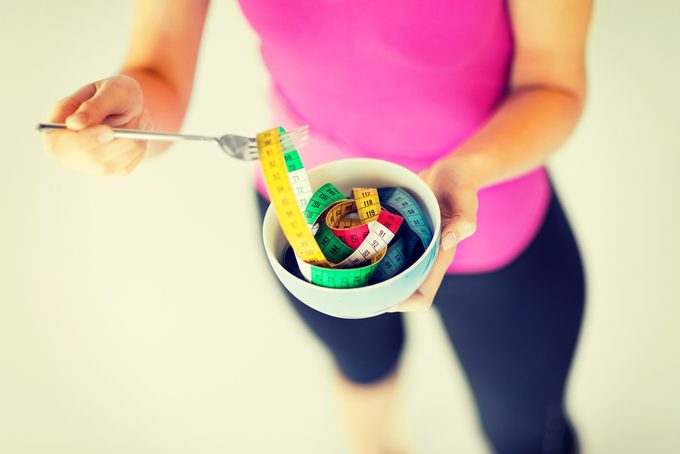True Story: “I Stopped Dieting And I Finally Lost Weight”
Michele Sponagle spent her life dieting – and had absolutely nothing to show for it. That’s when the light bulb went on: If dieting didn’t work, maybe not dieting would. Here’s her first-person account of how she gave up starving, abstaining and fasting and started on the nourishing path to a brighter, lighter future.

I don’t know what it’s like not to be fat.
As a toddler, I had big chubby cheeks and an insatiable appetite. It seemed, from that early age, that it was my destiny to become an overweight adult. It was as good as carved in stone as the child of parents (also overweight) who used food as a means to show love.
I think I started my first diet at 10 years old. My dad pushed me into it, offering me a dime for every pound I lost. Meanwhile, my mom kept our cupboards jammed full of junk food – potato chips, cookies and chocolate – which I had access to whenever I wanted and in unlimited quantities. Not surprisingly, I got fat.
As I grew older, the pain of being different from other kids became deeply painful. My brother teased me mercilessly, calling me “fat pig” until I rolled up into a ball with my hands over my ears and sobbed. I wanted to be a normal weight like others my own age, but I didn’t know how. I had the desire but not the knowledge or the ability to change. As I look back at the majority of my life, I feel as though I’ve been battling my body – a fight that has been exhausting and fruitless.
I can rhyme off the long list of diets and prescribed drugs (from the notorious fenfluramine/phentermine combination, or “fen-phen,” which was pulled off the market when it was linked to cardiovascular issues, to Prozac) that were supposed to help me lose weight. Some worked temporarily before the pounds came back with a vengeance.
The good news is that now, at age 54, I’ve finally been able to turn the tide. I’ve been able to lose weight and keep it off because I finally stopped dieting nearly two years ago. I also learned how to fail.
My Struggle With Weight Loss
Let me explain: In my desperation to lose weight, dieting was an all-or- nothing proposition. I’d start a new regimen, full of hope that I could stick to a plan as outlined, whether it was low-fat, low-carb, low-glycemic or whatever else I was trying. In that mindset, I insisted on eating correctly 100 percent of the time. If I slipped – and I always did – I ate poorly without even knowing whether I was hungry or not. When my new regimen derailed, I would hate myself and my body more than ever.
After constantly beating myself up for failing, I finally figured out that I had to change my thinking and embrace failure as part of the process of normalized eating. Nowadays, I allow myself to wander off the path I’m on. My eating is focused on low-carb foods, lean proteins, fruits, vegetables, and very little red meat and sugar – and it has been working.
I’m down three sizes. I can’t tell you how many pounds I’ve lost because I don’t weigh myself. I don’t even own a scale – I know myself too well, and I’d be obsessive with the number on the scale. I wanted off the diet merry-go- round, so not weighing myself is part of that. I rely on my clothing and how it fits to tell me how I’m doing with my eating.
Most importantly, I no longer make food choices based on their ability to help me lose weight; instead, I concentrate on what is healthy. If I shed some pounds in the process, that’s fine, but if I don’t, that’s OK, too. As long as I feel good, that’s good enough for me, despite the fact that I’m still obese. I feel like my relationship with food is normalizing. I eat to nurture my body. I use it less to soothe my anxiety and to fill a hole in my soul that a turbulent childhood, featuring an emotionally detached father and an overly attached mother, created.
I still have moments when I go off the rails. Most often, they come when I’m travelling, when all of my daily routines go to hell and access to good food becomes challenging. But the one promise I make to myself is that when I come home, I go back to my new normal: staying away from processed foods, having planned snacks and being active daily.
Finding The Right Path For Me
I don’t waste time lamenting the foods that I ate and shouldn’t have eaten; I just vow to pick up my new healthier habits where I left them. I don’t believe in rules – I think restrictions just feed a preoccupation with weight and set me up for failure. That said, I have adopted a 75/25 rule, where I do my best to make good food choices 75 percent of the time and enjoy indulgences 25 percent of the time. No food is off limits or demonized as “bad.”
It’s important to realize that there is no one-diet- fits-all solution. What works for me may not work for you. I choose low-carb foods because the high-carb ones – potatoes, rice and pasta – are like kryptonite for me. They drive me to binge. A little is never enough. I can’t seem to put on the brakes with these foods, so I have cut them out of my diet altogether. Once in a while, maybe while I’m out at a restaurant, I will indulge, but I don’t keep them in my house. I just can’t, and I know that.
I try to educate myself as much as possible about weight. I recently came across an Israeli study that surprised many when it determined that people process the very same meal differently with varying outcomes. Researchers looked at glycemic index (GI), a measurement of how food impacts blood sugar and insulin levels and plays a role in appetite control and hunger. The Atkins and South Beach diets were created with GI front and centre.
The flaw in the science of these – at least, according to this new information – is that the GI of foods isn’t a fixed number, as was previously thought. I think this is a significant finding because we could one day see an individual’s unique biology taken into consideration when physicians recommend weight management plans. Likely, we’ll see genetic testing play an important part in determining how and what you should be eating based on your DNA.
And if I can do some crystal ball gazing here, I’m sure the role of gut health on obesity will become clearer. Examining how the micro-organisms that live in our intestines affect everything from digesting food to protecting the immune system to regulating appetite is already a very hot area in research right now. Our Western diet, which leans heavily on processed foods, coupled with the overuse of antibiotics, has disturbed the healthy bacteria in our gut, and this has been connected to weight gain. Some scientists are calling micro-organisms “the missing link” in terms of understanding why some people have a propensity to gain weight and others don’t.
Why I Stopped Dieting
I am diligent about staying on top of current news related to the mechanics of obesity. My shift away from dieting is linked, in large part, to science. My research has led me to understand and accept the fact that diets don’t work. While stats vary, some say that 95 percent of diets fail. It’s something we don’t want to believe. It’s something that the diet and food indus- tries don’t want us to accept because it would have negative effects on their profitability. Looking at various studies, it became clear that I had bought into a myth – like unicorns and leprechauns – that I had spent a lifetime believing.
TV reality shows like The Biggest Loser aren’t helping to dispel the belief that dieting and exercising harder is the magical solution. It’s not. A recent study looked at 14 past winners. Thirteen of the 14 contestants regained the weight they had lost in the six years after the competition, and four contestants are heavier now than before appearing on the show. In the process of losing and gaining, they’ve seriously messed up their resting metabolic rate. One contetant now burns 800 fewer calories a day – that’s a big deficit to have to make up.
And just to make the picture of dieting even grimmer, the researchers found that the former competitors were constantly battling hunger, a desire to binge and cravings. One reason for this is the decrease in levels of leptin, a hormone that helps control hunger. Other hormones that help send “I’m full” signals also dropped. This makes me think that dieting is a losing – and not in a good way – proposition.
So I stopped dieting for good and doing my own thing. I don’t subscribe to any one type of eating regimen. To guide me to a healthier place, I try to use facts that are backed by an abundant body of scientific evidence, like the dangerous effects of sugar. As I learn more, I’m prepared to tweak the way I eat and what I eat as needed.
Despite being better educated about nutrition and such, I know there will be times when I will fail. But as I’ve discovered, when coupled with acceptance, failure can be a good thing indeed. It helps me give up on being perfect about my health choices. It’s what has finally set me free from dieting, and I am a healthier, happier person for it.




